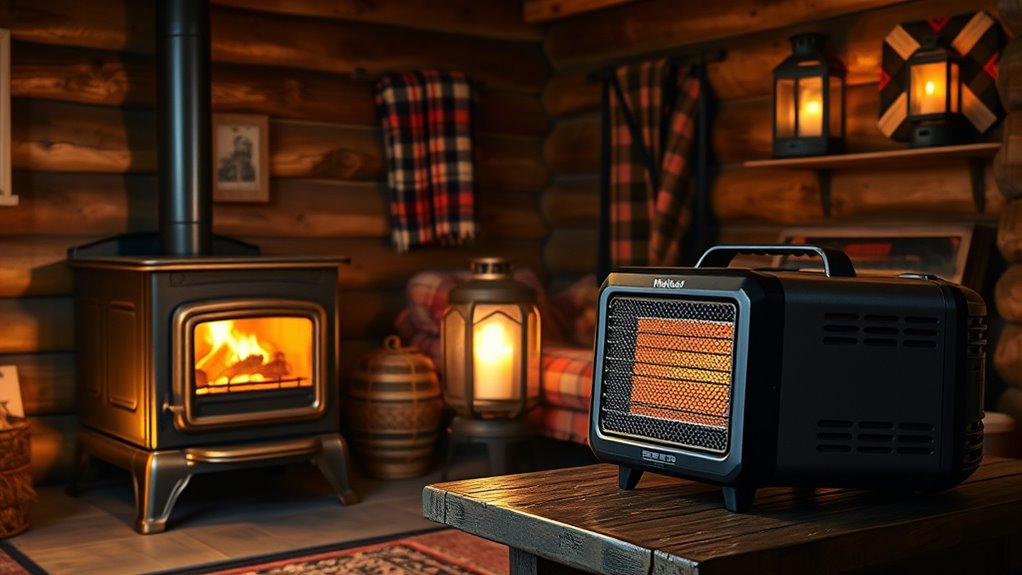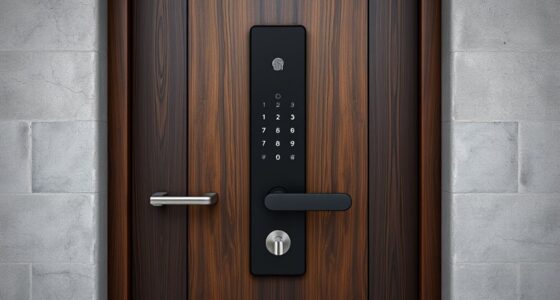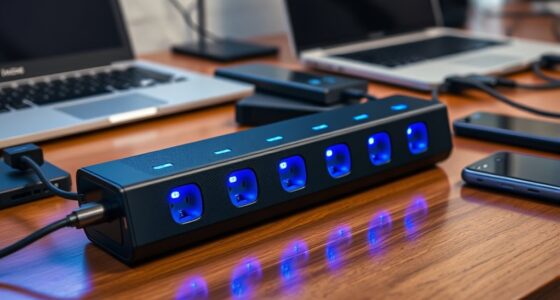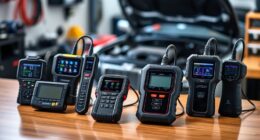If you’re looking for reliable backup heating systems for your cabin, I recommend considering options like propane radiant heaters, dual fuel gas fireplaces, electric space heaters, and portable propane units, which offer flexibility and safety features. High BTU models like the Big Buddy Heater or vent-free fireplaces guarantee ample warmth during outages. Space-efficient, easy-to-deploy options with safety certifications are key. Keep exploring to find the perfect solution that keeps you warm no matter what conditions you face.
Key Takeaways
- Consider portable propane radiant heaters for quick, efficient warmth during power outages in small cabins.
- Dual fuel gas fireplaces offer reliable, high-efficiency heating using natural gas or propane, suitable for larger spaces.
- Electric space heaters with backup power sources like generators or batteries ensure continuous warmth during outages.
- Choose compact, lightweight units with safety features and easy deployment for space-limited cabins.
- Incorporate environmentally friendly options such as solar-powered or energy-efficient electric heaters to reduce emissions and running costs.
9,000 BTU Portable Buddy Radiant Propane Heater
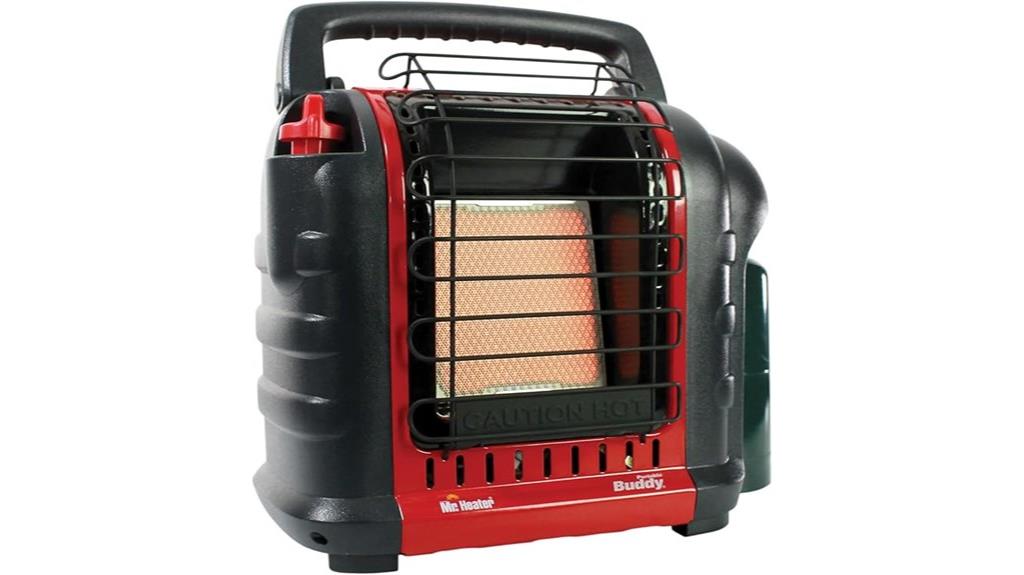
Are you looking for a reliable backup heater that’s easy to use and portable enough for cabin emergencies? The 9,000 BTU Portable Buddy Radiant Propane Heater is a great choice. It emits 4,000 or 9,000 BTU/hr radiant heat, warming up to 225 square feet. With two temperature settings—low and high—it runs about 5.4 hours on low and 2.4 hours on high using a small 1 lb propane cylinder. Built with safety in mind, it features an emergency low oxygen safety system and self-extinguishing materials. Compact and simple to operate, it’s perfect for keeping your cabin warm during unexpected outages.
Best For: individuals seeking a portable, reliable backup heater for cabins or emergency situations that can efficiently heat small spaces with safety features.
Pros:
- Emits adjustable radiant heat of 4,000 or 9,000 BTU/hr, suitable for small spaces up to 225 sq. ft.
- Equipped with an emergency low oxygen safety system for added safety during indoor use.
- Runs approximately 5.4 hours on low and 2.4 hours on high from a single 1 lb propane cylinder, making it convenient for short-term heating needs.
Cons:
- Limited runtime per propane cylinder may require frequent refills for extended use.
- Designed for small areas; not suitable for large or open spaces.
- Use of unauthorized accessories can void warranty and pose safety risks.
Erayak 3000W Power Inverter (12V DC to 110V/120V AC)

The Erayak 3000W Power Inverter is an excellent choice for cabins that require reliable backup power, especially when running essential heating systems or appliances. It converts 12V DC from batteries into 110V/120V AC, providing continuous 3000W power with a surge capacity of 6000W. With two AC outlets and direct-connect terminals, it easily powers refrigerators, water pumps, or small appliances during outages. Its heavy-duty design suits off-grid cabins or remote workshops, and the built-in LCD display offers real-time monitoring of voltage, power, and errors. Safety features like overvoltage, overload, and temperature protection guarantee dependable, secure operation in demanding environments.
Best For: those needing reliable off-grid backup power for refrigerators, small appliances, or workshops in remote or cabin settings.
Pros:
- Delivers continuous 3000W and surge 6000W, suitable for demanding loads
- Heavy-duty build designed for off-grid, remote, or emergency environments
- Built-in LCD display for real-time monitoring of voltage, power, and errors
Cons:
- Requires proper installation and load management for optimal safety and performance
- May be bulky for portable or compact use cases
- Limited to 12V DC input, requiring adequate battery capacity
VEVOR Diesel Air Heater with Remote Control and LCD Switch
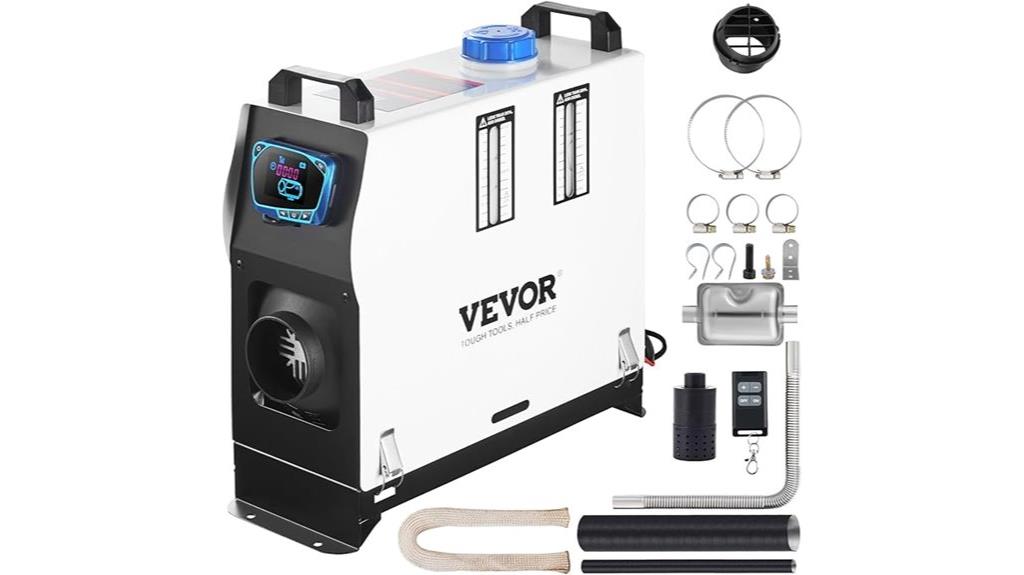
If you need reliable, efficient heating for outdoor adventures or remote cabins, the VEVOR Diesel Air Heater with Remote Control and LCD Switch stands out as an excellent choice. It’s compact, portable, and designed for diesel vehicles and outdoor use, providing 8KW of power. With a clear LCD display and remote control, I can easily adjust the temperature from up to 98 feet away, ensuring quick warmth and pre-heating. It heats rapidly within 10 minutes, works in temperatures as low as -40℉, and consumes minimal fuel. Its high-altitude capability and quiet operation make it perfect for maintaining comfort in even the most remote or rugged settings.
Best For: outdoor enthusiasts, RV owners, and remote cabin dwellers seeking reliable, efficient heating in cold environments.
Pros:
- Rapid heating within 10 minutes, ensuring quick warmth when needed
- Remote control and LCD display allow easy temperature adjustments from up to 98 feet away
- Low fuel consumption and quiet operation make it suitable for extended use and overnight stays
Cons:
- Limited to a single air outlet, which may require additional units for larger spaces
- Requires a 12V power source, potentially limiting use in some off-grid scenarios
- Portable but still relatively heavy at 18.8 pounds, which may require careful installation
Pleasant Hearth VFS2-PH20DT 20,000 BTU 23.5 in. Compact Gas vent free stove
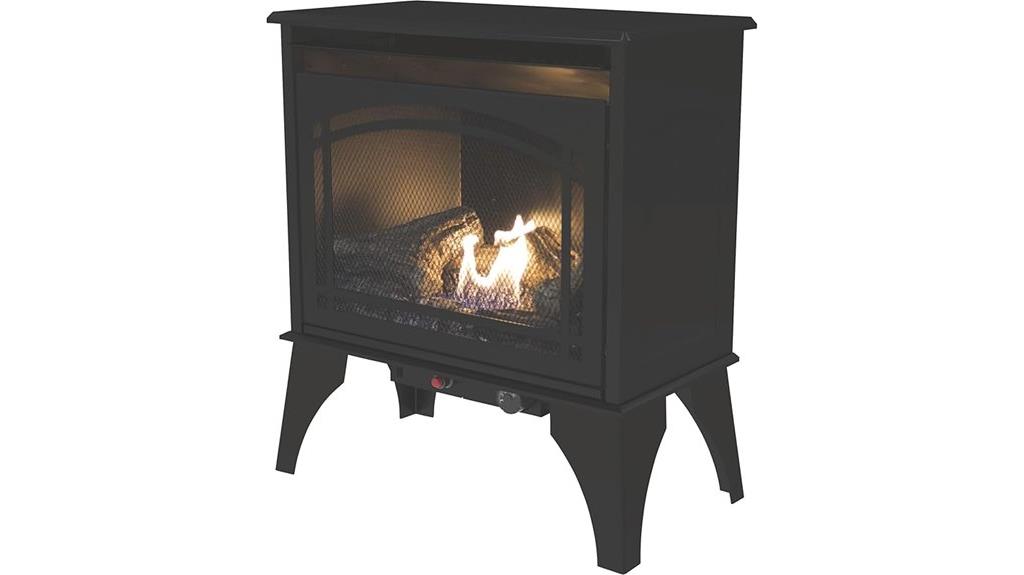
Looking for a reliable backup heating solution that’s easy to install and operate? The Pleasant Hearth VFS2-PH20DT is a compact, vent-free gas stove offering 20,000 BTUs of warmth, suitable for spaces up to 700 sq. ft. It features dual fuel capability—Propane or Natural Gas—giving you flexibility. The thermostat control keeps your desired temperature steady, and the dual burner creates a fuller flame display. With safety shut-offs and a minimal clearance design, it’s easy to install indoors. Weighing just 58 pounds, it’s a convenient, efficient option for maintaining warmth during power outages or cold snaps.
Best For: homeowners seeking a reliable, easy-to-install backup heating solution that provides adjustable warmth and flexible fuel options during power outages or cold weather.
Pros:
- Dual fuel technology allows use with Propane or Natural Gas for versatile fuel options.
- Compact design (23.5 inches) and minimal clearance requirements make installation flexible and space-efficient.
- Thermostat control maintains a consistent temperature automatically, enhancing comfort and convenience.
Cons:
- Does not support remote control operation, limiting remote accessibility.
- Requires a large propane tank (100-lb or larger) with a two-stage regulator, which may involve extra setup.
- No included blower; optional variable speed blower sold separately for enhanced heat distribution.
ProCom ML300TBA-B Space Heater with Thermostat
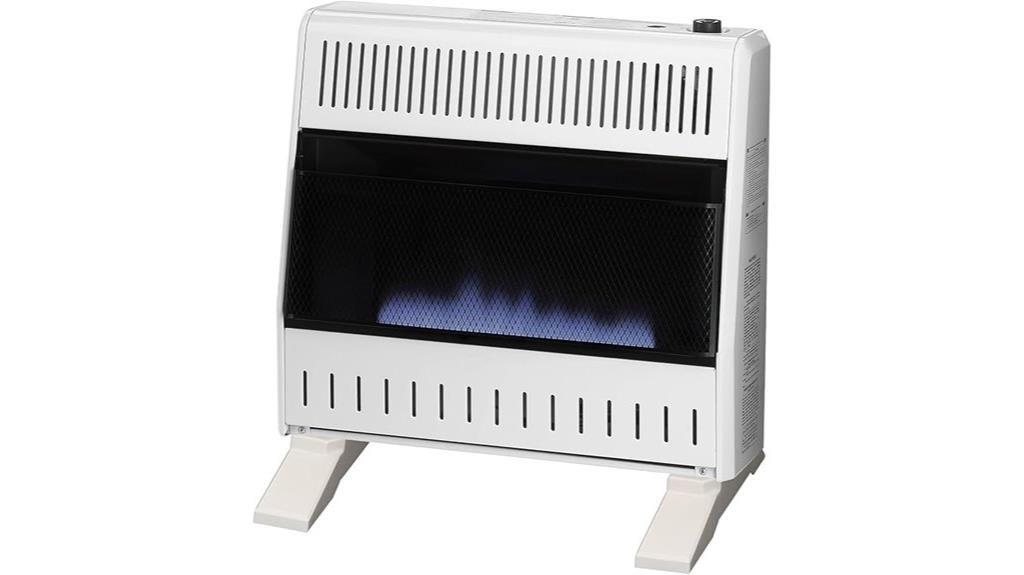
For those seeking a reliable backup heating option during power outages or emergencies, the ProCom ML300TBA-B Space Heater with Thermostat offers an excellent solution. This ventless propane heater delivers up to 28,000 BTU, efficiently warming spaces up to 1,400 square feet, making it perfect for cabins, homes, or offices. Its modern, slim design fits seamlessly into various settings, while the thermostat allows for customizable comfort. Safety is a priority, with features like oxygen depletion sensors and push-button ignition. Plus, it operates without electricity, ensuring warmth even during power failures. Overall, it’s a versatile, safe, and effective backup heat source.
Best For: individuals seeking a reliable, efficient, and safe backup heating solution for small to medium spaces during power outages or emergencies.
Pros:
- Produces up to 28,000 BTU to heat areas up to 1,400 sq. ft. efficiently
- Operates without electricity, ensuring warmth during power failures
- Equipped with safety features like oxygen depletion sensor and push-button ignition
Cons:
- Ventless design requires proper indoor ventilation and safety precautions
- May require propane refilling and maintenance for optimal operation
- Limited to small to medium spaces, not suitable for large areas
Dyna-Glo 30,000 BTU Liquid Propane Blue Flame Wall Heater
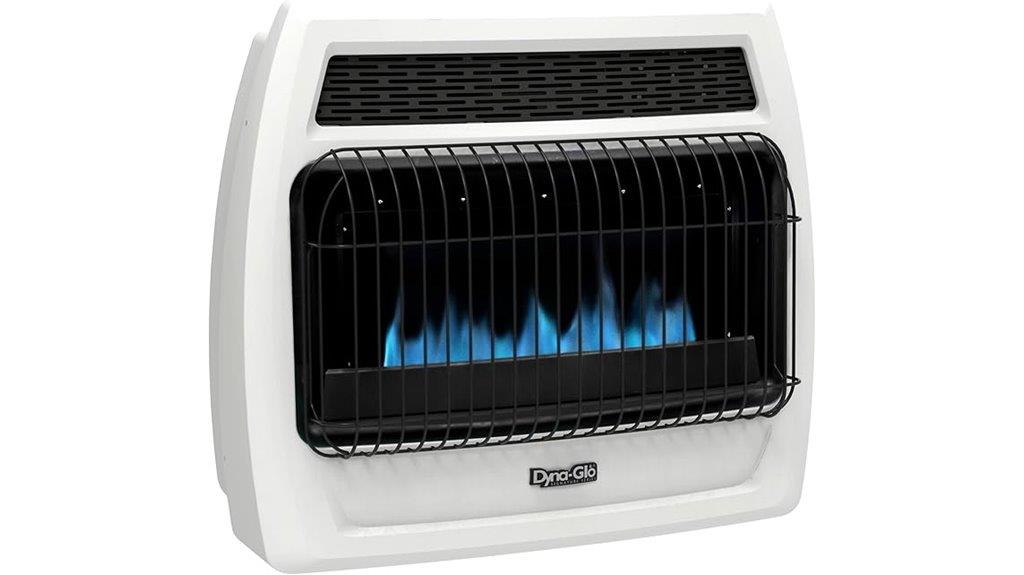
The Dyna-Glo 30,000 BTU Liquid Propane Blue Flame Wall Heater is an excellent backup heating option for cabins, especially since it operates without electricity. It features blue flame technology that heats efficiently by convection, similar to central heating systems. With adjustable heat output from 24,000 to 30,000 BTUs, I can customize comfort levels easily. Since it runs solely on liquid propane, there’s no need for power, making it reliable during outages. Its vent-free design ensures even heat distribution, and the built-in thermostat maintains a consistent temperature. Compact and safe, this heater offers dependable warmth when you need it most.
Best For: households or cabins needing reliable, electricity-free supplemental heating during power outages, especially in spaces up to 1,000 sq. ft.
Pros:
- No electricity required, ensuring operation during power outages
- Adjustable heat output from 24,000 to 30,000 BTUs for customizable comfort
- Vent-free design allows for efficient, even heat distribution within indoor spaces
Cons:
- Only operates on liquid propane; no fuel conversion options available
- Requires proper ventilation and safety precautions due to vent-free design
- May produce carbon monoxide; needs adequate oxygen supply and safety measures
Mr. Heater MH18CH Radiant Cabinet LP Heater,Black
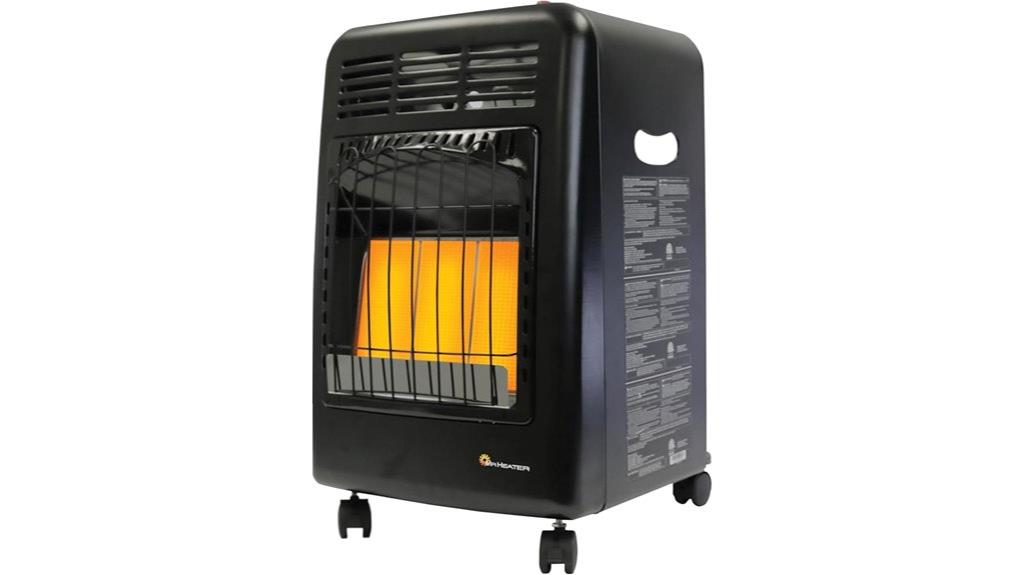
When you need reliable backup heating for outdoor cabins, the Mr. Heater MH18CH Radiant Cabinet LP Heater is a solid choice. It’s portable, heats up to 450 square feet, and mimics sunlight’s warmth. Made of durable steel, it features safety features like tip-over and low oxygen shutoff, ensuring safe operation outdoors. No electricity is needed, and it runs up to 72 hours on a 20-pound propane tank at minimum BTUs. With three heat settings and CSA certification, it’s both effective and safe. Its compact design makes it easy to move and install, providing dependable warmth when you need it most.
Best For: outdoor enthusiasts and cabin owners seeking a reliable, portable, and safe heating solution for outdoor spaces without electricity.
Pros:
- Heats up to 450 sq ft, ideal for patios and outdoor cabins
- No electricity required, reducing fire hazards and noise
- Built-in safety features like tip-over switch and low oxygen shutoff
Cons:
- Requires a 20lb propane tank and proper connection setup
- Designed solely for outdoor use, limiting indoor applications
- Heavier and bulkier compared to smaller portable heaters
Mr. Heater Blue Flame Vent Free Propane Heater
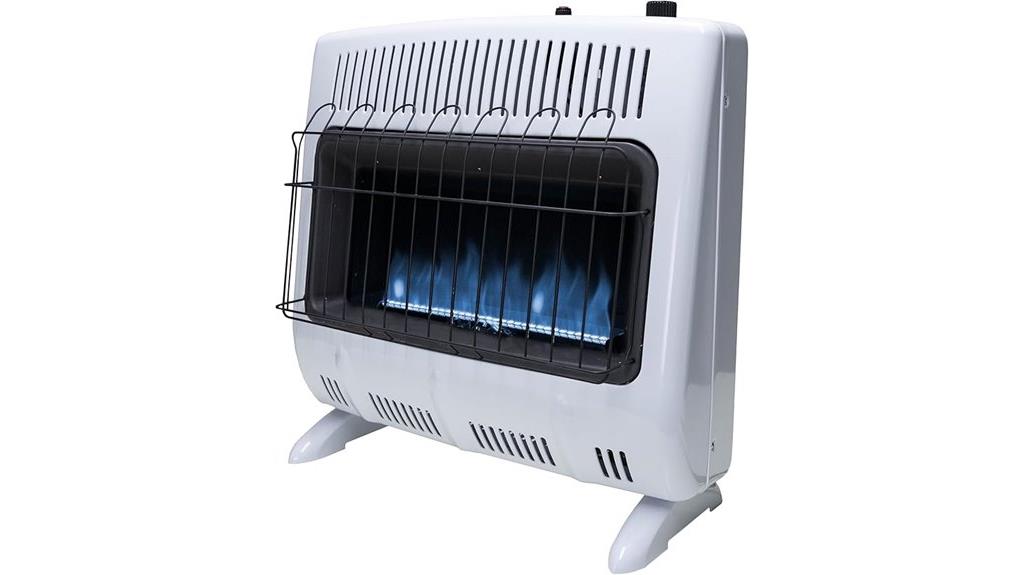
If you’re looking for a reliable backup heating option that can quickly warm a cabin up to 1,000 square feet, the Mr. Heater Blue Flame Vent Free Propane Heater is a great choice. It delivers up to 30,000 BTUs, ensuring efficient heating even at elevations up to 4,500 feet. With a thermostat and electronic ignition, it’s easy to control and start. Safety features like automatic low oxygen shut-off and CSA certification provide peace of mind. The blue flame burner offers even convection heat, and its versatile mounting options make installation straightforward, whether wall-mounted or free-standing. It’s a dependable, efficient solution for keeping your cabin warm in emergencies.
Best For: homeowners or cabin owners seeking a reliable, efficient backup heating solution for spaces up to 1,000 sq. ft., especially in colder or higher elevation environments.
Pros:
- Provides powerful heating up to 30,000 BTUs, effectively warming larger rooms or cabins
- Features thermostat control and electronic ignition for easy, precise operation
- Comes with safety features like automatic low oxygen shut-off and CSA certification for安心 indoor use
Cons:
- Requires proper mounting or placement, which may involve some installation effort
- Uses propane fuel, necessitating regular refills and storage considerations
- Not suitable for spaces larger than 1,000 sq. ft., limiting its use in bigger areas
Mr. Heater Vent Free Blue Flame Dual Fuel Heater
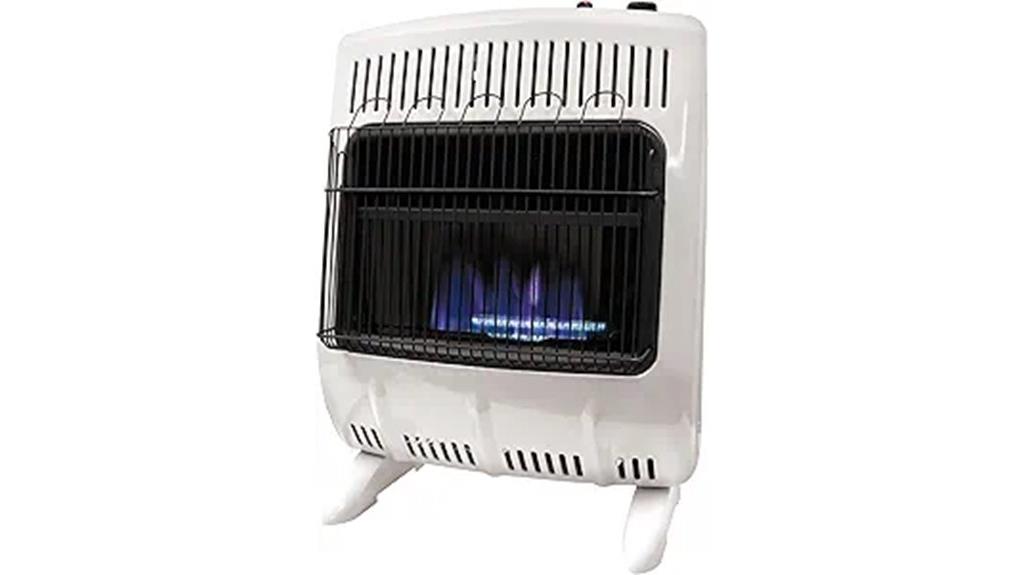
For anyone seeking a reliable backup heating option that’s easy to install and operate indoors, the Mr. Heater Vent Free Blue Flame Dual Fuel Heater is a great choice. It heats up to 700 sq. ft. with 20,000 BTU per hour and works well at elevations up to 4,500 feet. Its dual fuel capability lets you use natural gas or propane, offering flexibility and efficiency. Safety features like an automatic low oxygen shut-off and patented fuel connection ensure safe operation. With a thermostat, quick electronic ignition, and options for wall or floor mounting, it’s a versatile and modern solution for cozy indoor warmth.
Best For: homeowners seeking a reliable, efficient, and easy-to-install indoor heating solution that can run on natural gas or propane.
Pros:
- Dual fuel capability provides flexibility in fuel choice.
- Safety features like low oxygen shut-off and patented fuel connection enhance security.
- Compact, modern design allows for wall or floor installation, fitting various spaces.
Cons:
- Ventless operation may not be suitable for all indoor environments or preferences.
- Limited coverage area of up to 700 sq. ft., not ideal for larger spaces.
- Requires a steady fuel supply, which might involve additional installation considerations.
Camp Chef Alpine CS14 Heavy Duty Cylinder Tent Cabin Stove
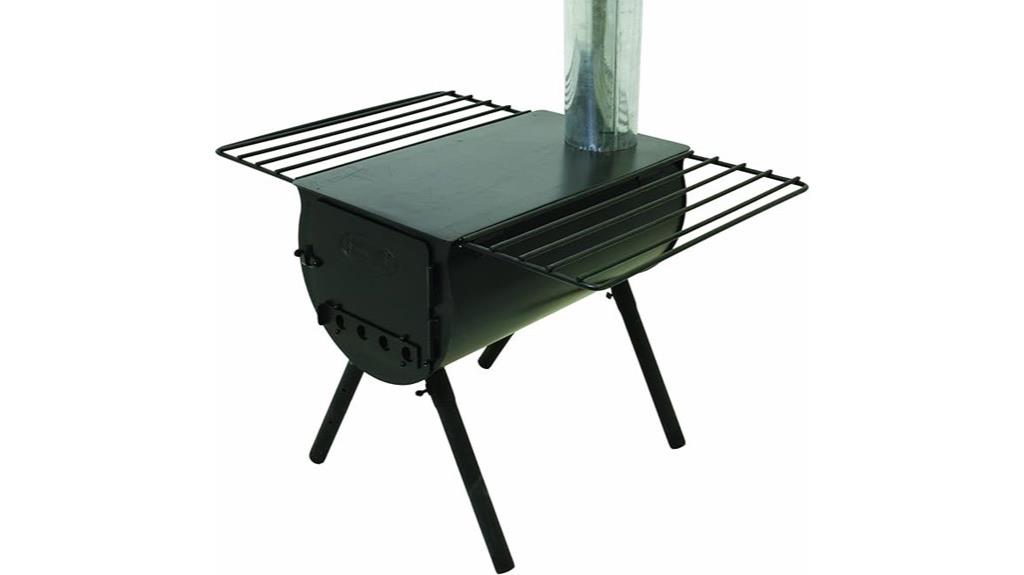
The Camp Chef Alpine CS14 Heavy Duty Cylinder Tent Cabin Stove stands out as an ideal backup heating option for those who need a durable, portable solution for cabin or tent use. Its heavy-duty steel construction guarantees long-lasting durability, while all parts neatly store inside for easy transport. The stove features a 5-inch diameter chimney pipe over 10 feet tall, including a damper and wire spark arrestor for safe ventilation. It also offers a wide drying rack, adjustable legs for uneven ground, and water tank brackets (tank sold separately). Compact and sturdy, this stove provides reliable warmth wherever you go.
Best For: outdoor enthusiasts, campers, and cabin owners seeking a durable, portable heating solution for tents or cabins.
Pros:
- Heavy-duty steel construction ensures long-lasting durability.
- All parts conveniently store inside the stove for easy transportation.
- Includes a 5-inch chimney pipe with damper and spark arrestor for safe ventilation.
Cons:
- Water tank is sold separately, adding extra cost.
- May be heavy to carry without assistance due to steel construction.
- Requires setup of chimney pipe, which can be time-consuming.
8KW Portable Diesel Air Heater with LCD & Remote for Vans, RV, Truck, Boat
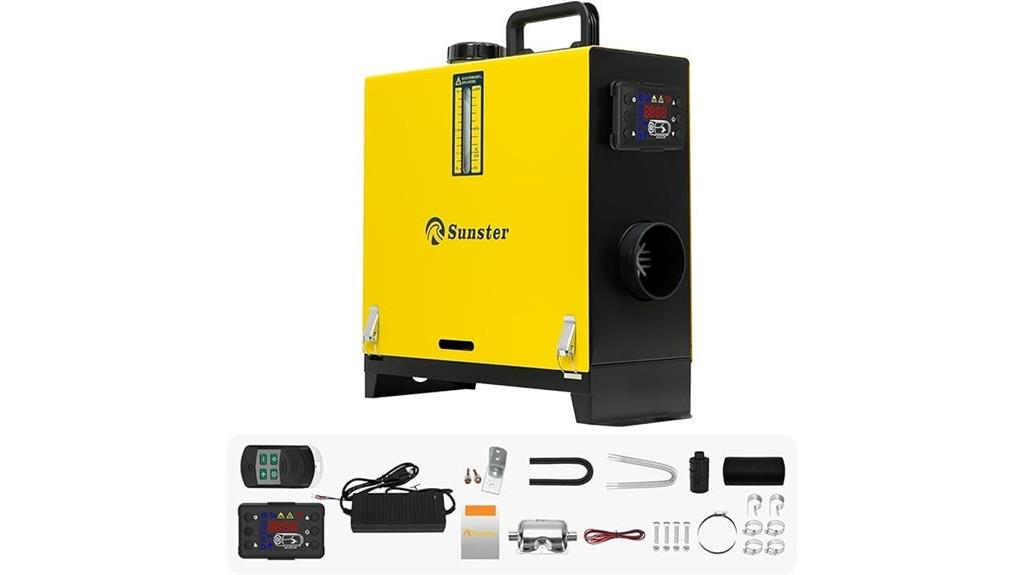
With its powerful 8KW output and compatibility with 12V, 24V, and 110V power sources, the KW Portable Diesel Air Heater is an ideal backup heating solution for those who need reliable warmth on the go. Its all-in-one design features an LCD monitor and remote control, making operation simple and convenient. Built with high-quality aluminum alloy, it offers fast heating, excellent heat dissipation, and a long service life. It efficiently warms RVs, boats, trucks, and other outdoor spaces, with low noise levels and over-temperature protections. Its versatility and safety features make it a dependable choice for keeping your cabin or vehicle cozy in any situation.
Best For: outdoor enthusiasts, RV owners, and vehicle operators seeking reliable, portable heating solutions for camping, boating, or emergency use.
Pros:
- Powerful 8KW heating capacity with high efficiency and rapid warmth delivery.
- Versatile compatibility with 12V, 24V, and 110V power sources for flexible use.
- Compact, all-in-one design with LCD monitor and remote control for easy operation.
Cons:
- Professional installation recommended due to external exhaust requirements.
- Limited customer reviews currently, which may affect initial confidence.
- Slightly heavier weight at 20.3 pounds, which may impact portability for some users.
18,000 BTU Big Buddy Heater
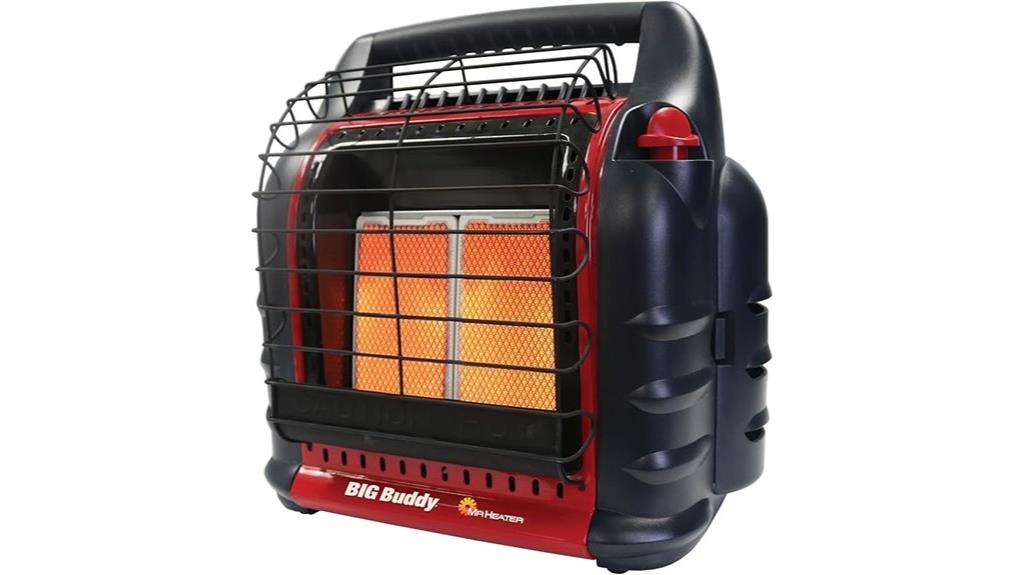
If you need reliable heat in small spaces like cabins, ice shanties, or garages, the 18,000 BTU Big Buddy Heater stands out as an excellent backup option. It offers adjustable radiant heat with three settings—4,000, 9,000, or 18,000 BTU/hr—covering up to 400 square feet. Portable and easy to set up, it connects to propane cylinders or tanks with swivel regulators. Safety features like oxygen depletion sensors, thermal shut-down, and tip-over protection make certain of secure operation. Weighing just 13 pounds, it’s suitable for indoor and outdoor use, making it a versatile choice for keeping warm during cold emergencies or recreational outings.
Best For: individuals seeking portable, reliable heating for small indoor or outdoor spaces like cabins, garages, or ice shanties during cold weather.
Pros:
- Adjustable heat settings (4,000, 9,000, 18,000 BTU/hr) for customized comfort
- Safety features including oxygen depletion sensor and tip-over switch for secure operation
- Lightweight design (13 pounds) and portable with easy hookup to propane tanks
Cons:
- Heats approximately 400 square feet, which may be insufficient for larger spaces
- Requires propane cylinders or tanks, which need to be purchased separately
- May produce moisture or fumes, so proper ventilation is necessary when used indoors
ProCom Dual Fuel Gas Fireplace System with Mantle
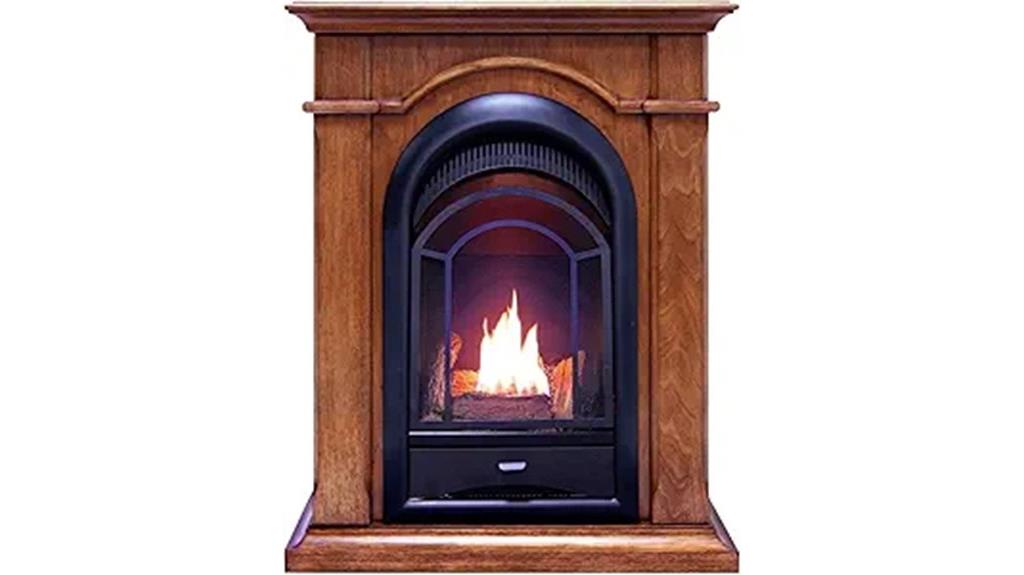
For cabin owners seeking a reliable and versatile backup heating solution, the ProCom Dual Fuel Gas Fireplace System with Mantle stands out because it can operate on Natural Gas or Liquid Propane, ensuring warmth even during supply outages. It features a 10,000 BTU vent-free heater suitable for spaces up to 500 sq. ft., with an impressive 99.9% efficiency. The system includes a realistic ceramic log set, a stylish furniture-grade mantle, and safety features like oxygen sensors and a pilot oxygen depletion sensor. Its simple installation requires no chimney or duct, and the easy-to-use thermostat maintains a comfortable temperature automatically. This fireplace combines functionality, safety, and aesthetic appeal for reliable backup heat.
Best For: cabin owners or homeowners seeking a reliable, versatile backup heating solution that can operate on Natural Gas or Liquid Propane, with efficient, safe, and aesthetically pleasing features.
Pros:
- Dual fuel capability allows operation on both Natural Gas and Liquid Propane for flexibility during outages
- High efficiency of 99.9% ensures effective space heating up to 500 sq. ft.
- Safety features include oxygen sensors, pilot oxygen depletion sensor, and battery-assisted ignition for peace of mind
Cons:
- Requires a minimum clearance of 42 inches from the top to the ceiling, potentially limiting installation options
- No outside duct or chimney needed, which might not suit all aesthetic or ventilation preferences
- Limited to 10,000 BTU heating output, which may not be sufficient for very large or drafty spaces
DeLonghi Radia S Oil-Filled Radiator Space Heater
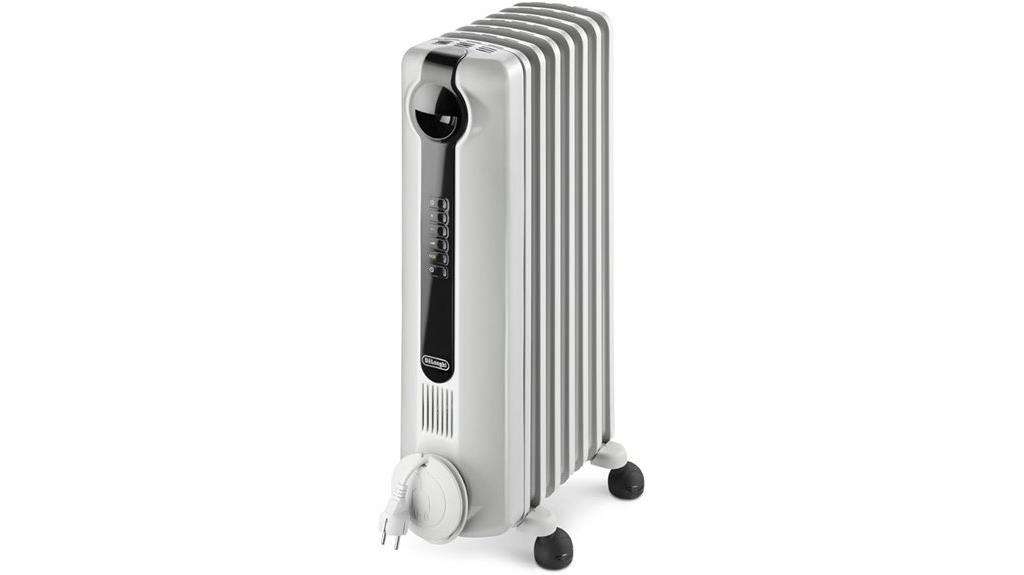
The DeLonghi Radia S Oil-Filled Radiator Space Heater is an excellent backup heating option for cabins because it provides quiet, consistent warmth without the noise and dust associated with fan-based heaters. With 1500W of power, it effectively heats small to medium spaces up to 250 square feet. Its digital control panel, adjustable thermostat, and three heat settings make it easy to customize comfort. The heater’s sealed oil reservoir guarantees long-lasting heat, while patented smart-snap wheels allow for effortless mobility. Designed for safe, efficient operation, it’s a reliable choice for maintaining warmth during power outages or cold snaps.
Best For: those seeking a quiet, energy-efficient heating solution for small to medium spaces like bedrooms, home offices, or cabins, especially during power outages or cold snaps.
Pros:
- Provides silent, consistent heat without fan noise or dust circulation
- Easy to move with patented smart-snap wheels and no assembly required
- Features a sealed oil reservoir for long-lasting, reliable warmth
Cons:
- Suitable primarily for spaces up to 250 sq. ft., limiting larger room coverage
- May take longer to heat larger areas compared to fan heaters
- Higher upfront cost compared to basic space heaters
Factors to Consider When Choosing a Backup Heating System for Cabins

When selecting a backup heating system for a cabin, I consider several key factors to guarantee it meets my needs. Compatibility with available power sources, heating capacity, safety features, installation ease, and portability all play vital roles. Focusing on these points helps me choose a reliable and practical solution.
Power Source Compatibility
Choosing a backup heating system that matches your cabin’s existing power sources is essential to guarantee a smooth and cost-effective shift during outages. First, verify if the system is compatible with your current power supply, whether it’s 12V DC, 110V AC, or 220V AC, to avoid costly electrical modifications. Consider whether the unit can operate on alternative fuels like propane, natural gas, or diesel, especially if those are readily available near your cabin. A system with dual power options or an automatic switch-over feature can ensure continuous warmth without manual intervention. Also, check the power output and energy efficiency to match your cabin’s size and insulation, preventing overloads and maximizing safety features like surge protection and overload safeguards.
Heating Capacity Needs
Selecting a backup heating system involves guaranteeing it can handle your cabin’s specific size and insulation qualities. To do this, I recommend calculating the square footage of your space and choosing a system with an appropriate BTU output—roughly 20 BTUs per square foot for well-insulated cabins. If your cabin has poor insulation or many windows, you’ll need a higher BTU rating to maintain warmth. Consider whether the system is for all-day heating or just occasional use during extreme cold, as this influences capacity needs. Also, factor in your local climate and winter temperatures to ensure reliable performance. Ultimately, if you have multiple backup units, make sure their combined heat output meets or exceeds your highest heating demand during extended outages or cold spells.
Safety Features Importance
Ensuring safety features are in place is essential when selecting a backup heating system for your cabin, as these mechanisms protect you from potential hazards like carbon monoxide poisoning, fires, and gas leaks. Safety features such as oxygen depletion sensors and automatic shut-off systems are necessary to prevent dangerous carbon monoxide buildup indoors. Ventless systems should include sensors to detect unsafe air quality levels and shut down if needed. Additional safety measures like shut-off switches, tip-over protection, and thermal cut-offs help prevent fires and accidents. Choosing systems with safety certifications from organizations like CSA or UL provides added assurance that they meet recognized safety standards. Reliable safety features are critical for peace of mind, ensuring your cabin remains a safe and warm refuge during harsh conditions.
Installation Complexity Level
The installation complexity of a backup heating system can vary greatly depending on its design and the existing infrastructure in your cabin. Some systems, like ventless or portable units, are simple to install and often require no permanent modifications—just plug them in or set them up. In contrast, systems that need venting or chimney connections involve more steps, such as ensuring proper venting, complying with local building codes, and possibly making structural changes. Electrical or gas line connections also add complexity, as they must meet safety standards and may need permits or inspections. Overall, portable or plug-and-play options are the easiest to install, while more integrated systems require careful planning, professional help, and time.
Portability and Storage
When choosing a backup heating system for your cabin, portability and storage become key factors, especially if space is limited or you need to move the heater frequently. A lightweight, compact design makes transportation and storage easier, particularly in tight spaces. Foldable or collapsible models are excellent for quick setup and packing away when not in use. Features like integrated handles, wheels, or carrying cases can markedly enhance portability, especially in outdoor or off-grid settings. Units with small footprints and vertical designs help maximize limited space without sacrificing performance. Additionally, easy access to power sources and minimal setup requirements are vital for rapid deployment during emergencies. Prioritizing these aspects ensures your backup system is both convenient to store and ready to use whenever needed.
Fuel Efficiency Considerations
Choosing a backup heating system for your cabin means paying close attention to fuel efficiency, as it directly impacts ongoing costs and sustainability. I look for heaters with high fuel efficiency ratings, ideally consuming less than 0.5 gallons per hour, to keep expenses manageable. It’s important to evaluate the heater’s thermal output relative to fuel consumption, ensuring you get maximum heat with minimal fuel use. I prefer models designed for continuous operation that provide reliable warmth without wasting fuel. Adjustable heat settings are a plus, allowing me to control fuel consumption based on occupancy and temperature needs. Additionally, I prioritize units with efficient combustion technology like blue flame or catalytic systems, which convert fuel into heat more effectively, helping me stay warm without unnecessary waste.
Environmental Impact Factors
Considering the environmental impact of a backup heating system helps me make responsible choices that minimize my cabin’s carbon footprint. I prefer renewable energy sources like solar or wind, which substantially cut emissions and reduce environmental harm. Propane and natural gas heaters emit fewer greenhouse gases than electric systems that rely on fossil-fuel-generated electricity. If I choose a wood-burning stove or pellet heater, I ensure sustainable sourcing to lessen air pollution, though I remain aware of particulate matter. Electric systems with energy-efficient appliances also help by lowering overall power consumption. Additionally, incorporating energy storage like batteries allows me to maximize renewable energy use and reduce reliance on grid electricity. Balancing these factors helps me choose a system that’s both effective and environmentally conscious.
Frequently Asked Questions
What Safety Features Should I Look for in Backup Heating Systems?
When choosing a backup heating system, I look for safety features like automatic shut-off if the system overheats or detects low oxygen levels, carbon monoxide detectors, and sturdy, non-combustible materials. I also prioritize systems with clear safety instructions and easy-to-access emergency shut-offs. These features give me peace of mind, knowing that even in emergencies, the risk of fire or poisoning is minimized and my cabin stays safe.
How Energy-Efficient Are Different Portable Cabin Heaters?
Portable cabin heaters vary in energy efficiency, but I find that infrared models are among the most efficient because they directly heat objects and people rather than the air. Electric heaters are generally efficient but can consume a lot of power if used continuously. Gas-powered options are less efficient overall but can be useful in emergencies. I always look for models with adjustable thermostats to optimize energy use and save on costs.
Can Backup Heating Systems Operate During Power Outages?
Absolutely, backup heating systems can operate during power outages! Think of them as your cabin’s guardian angels, stepping in when the main power fails. I’ve personally installed generators and battery systems that keep my cabin warm through storms and blackouts. As long as they’re properly maintained and fueled or charged, they’ll keep the cold at bay, making sure you stay cozy no matter what Mother Nature throws your way.
What Maintenance Is Required for Propane and Diesel Heaters?
Propane and diesel heaters require regular maintenance to keep them running efficiently. I recommend inspecting filters monthly, cleaning or replacing them as needed, and checking for leaks or corrosion. It’s also important to make certain of proper ventilation, especially for propane units, and to schedule annual professional servicing. By staying on top of these tasks, I ensure my heaters stay reliable and safe during cold spells.
Are There Environmentally Friendly Backup Heating Options for Cabins?
Imagine a gentle breeze that warms without harming the environment—that’s what eco-friendly backup heating options offer. I’d recommend solar-powered heaters, biomass stoves, or heat pumps, which produce minimal emissions and run sustainably. These options not only keep your cabin cozy but also protect nature’s beauty. I’ve found they’re reliable and efficient, making them perfect for environmentally conscious folks who want warmth without the guilt.
Conclusion
No matter which backup heating system you choose, prioritize safety and reliability. I know it can feel overwhelming with so many options, but investing in a quality heater guarantees you stay warm when it matters most. Remember, a dependable backup keeps cabin life comfortable and safe, even during emergencies. So, don’t compromise—pick a system that suits your needs and gives you peace of mind, knowing you’ll stay cozy no matter what.
